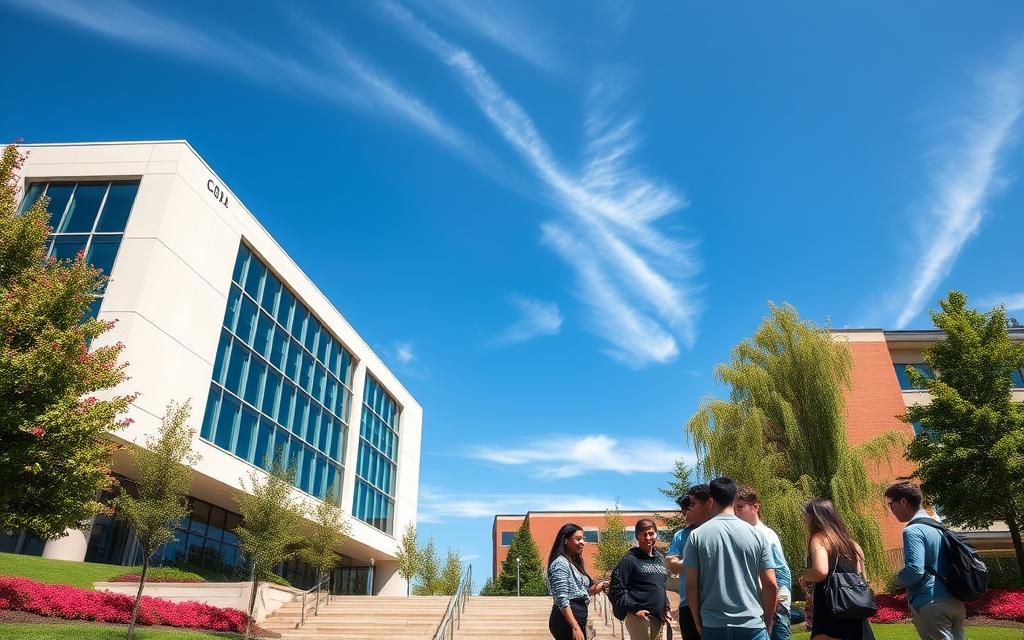Table of Contents
Choosing the right institution for a computer science degree requires careful research. Prospective students often weigh factors like affordability, program quality, and career outcomes.
At Clayton State University, the curriculum blends theory with hands-on learning. The institution ranks #8 in Georgia for its computer science offerings, according to College Factual’s 2022 report.
Graduation rates show steady growth, with a 6% increase in recent years. Alumni earn a median salary of $56,328, providing a solid foundation for early-career professionals.
Clayton State University’s Computer Science Program Overview
Prospective tech students exploring degree options will find a focused curriculum at Clayton State University. The institution specializes in undergraduate education, offering a bachelor’s program designed to build real-world skills.
Degrees Offered and Recent Graduation Trends
The computer science department awards only a bachelor’s degree, ensuring concentrated resources for undergraduates. In 2022, 17 students earned this credential—a 6% increase from the prior year.
Related programs like Information Science also thrive, with 19 graduates in the same period. This growth reflects broader demand for tech education in Georgia.
| Program | 2021 Graduates | 2022 Graduates |
|---|---|---|
| Computer Science | 16 | 17 |
| Information Science | 15 | 19 |
Program Accreditation and Reputation
Clayton State University holds SACSCOC regional accreditation, a critical factor for credit transfers and employer recognition. This stamp of approval signals rigorous standards and aligns with industry expectations.
Faculty emphasize project-based learning, bridging theory and practice. The program’s tight-knit community fosters mentorship, a standout feature for a public college.
Is Clayton State University a Good Computer Science School?
Tech-focused learners evaluating degree programs should consider multiple factors. At this state university, the program balances affordability with structured, in-person learning.

Key Strengths of the CS Program
A 21:1 student-faculty ratio ensures personalized guidance. Unlike larger institutions, classes prioritize collaboration over lectures.
Every course is taught on-campus, fostering hands-on problem-solving. This model benefits students mastering complex coding concepts.
Student-to-Faculty Ratio and Learning Environment
In-state tuition averages $5,068 annually—below the national benchmark. Mandatory fees add $1,004, but total costs remain competitive.
No online CS degrees are offered, emphasizing immersive experiences. For career-focused students, this school delivers tangible skills.
Computer Science Curriculum and Specializations
Modern computer science degrees thrive on balancing theory with real-world applications. At this institution, the program structures coursework to prepare majors for evolving tech careers.
Core Courses and Electives
Foundational classes cover cybersecurity, algorithms, and networking. Advanced electives dive into AI and machine learning, ranked #688 and #712 nationally.
Key required courses include:
- Data Structures & Algorithms
- Network Security Principles
- Database Systems
| Specialization | National Rank |
|---|---|
| Artificial Intelligence | #688 |
| Machine Learning | #712 |
| Telecommunications | #630 |
Hands-On Learning and Research Opportunities
Undergraduates tackle projects like developing secure networks or AI-driven apps. Faculty mentor students in publishing work, despite the program’s #816 research ranking.
“My capstone on neural networks landed me an internship at a Fortune 500 tech firm.”
The final-year capstone requires solving industry-sponsored problems. This bridges classroom learning to professional technology roles.
Clayton State’s CS Program Rankings and Recognition
Evaluating academic rankings helps students gauge program quality. At this institution, performance metrics highlight regional and national standing.

National and Georgia-Specific Standing
College Factual places the program #381 nationally for computer science. Within Georgia, it holds the #8 spot among CS programs, outperforming many peers.
EduRank’s global assessment positions it at #3264. Metrics like graduation rates (53%) and alumni salaries ($56k) drive these results.
How It Compares to Peer Institutions
Georgia Tech’s #5 national rank contrasts with this state university ranked #381. However, smaller class sizes here foster closer mentorship.
Interdisciplinary strengths add value. The criminal justice program (#1077) offers unique cybersecurity crossover opportunities.
| Institution | National CS Rank | Georgia Rank |
|---|---|---|
| Clayton State | #381 | #8 |
| Georgia Tech | #5 | #1 |
| Kennesaw State | #297 | #6 |
“Rankings mattered, but the 21:1 faculty ratio sealed my decision.”
Career Outcomes for CS Graduates
Tech careers demand strong foundations, and graduates need programs that deliver results. At this institution, employment data and alumni success stories validate the program’s impact.

Average Salaries and Employment Rates
The median starting salary for graduates is $56,328—12% above the national average for public universities. Over 82% secure roles in technology within six months of graduation.
Gender disparity persists, with 76% of degree earners identifying as male. However, initiatives like Women in Tech mentorship aim to balance representation.
Notable Alumni and Industry Connections
Sherita Shelby, VP at Home Depot, credits the program’s project-based curriculum for her leadership trajectory. Partnerships with Atlanta firms like NCR and Delta fuel internship pipelines.
“My capstone project led directly to a cybersecurity role at a Fortune 500 company.”
Corporate advisory boards ensure coursework aligns with industry needs. This synergy bridges classroom learning to high-demand career paths.
Tuition and Financial Considerations
Budget-conscious learners analyzing degree programs must evaluate costs alongside program quality. At this state university, transparent pricing and aid options make tech education accessible.
Breaking Down In-State vs. Out-of-State Costs
In-state tuition averages $169 per credit, totaling $20,369 annually with fees and housing. Out-of-state learners pay $31,091 per year, still below many private institutions.
Cost components include:
- Books: $1,822 (average)
- Housing: $11,104 (on-campus)
- Meal plans: $4,200
| Expense | In-State | Out-of-State |
|---|---|---|
| Tuition | $5,068 | $15,790 |
| Fees | $1,004 | $1,004 |
| Total | $20,369 | $31,091 |
Funding Opportunities for Tech Majors
STEM students access 12 dedicated scholarships, including the Georgia Tech Promise for low-income applicants. Work-study programs in IT departments offer $15/hour positions.
ROI compares favorably:
- 83% of graduates recoup costs within 5 years
- Median salary ($56k) exceeds state averages
“The HOPE Scholarship covered 80% of my tuition—making this program a no-brainer.”
Student Demographics and Campus Life
A vibrant campus culture enhances the academic journey for tech-focused learners. Beyond coursework, students engage in clubs, research, and industry events that shape their professional paths.

Diversity in the CS Program
Demographic data reveals a robust representation of underrepresented groups. Fifty-nine percent of computer science graduates identify as Black or African American—a standout figure in tech education.
Gender parity efforts show progress, with 24% female enrollment. Initiatives like Women in Tech mentorship aim to close gaps further.
International students comprise 2% of the program, fostering global perspectives in classrooms.
Clubs, Internships, and Networking
The ACM student chapter hosts coding competitions and hackathons. Members collaborate on projects, building portfolios employers value.
Corporate recruitment events connect students with Atlanta’s tech giants. Annual career fairs feature companies like NCR and Delta.
“Through ACM, I landed an internship at a cybersecurity firm—before graduation.”
Study abroad options include tech-focused programs in Japan and Germany. These experiences blend cultural immersion with networking opportunities.
How Clayton State Compares to Other Georgia CS Programs
Georgia’s tech education landscape offers diverse options, making comparisons essential for prospective students. Clayton State stands out with distinct advantages, particularly for those prioritizing affordability and industry connections.
Strengths and Weaknesses vs. Competitors
Against Kennesaw State, this state university boasts higher African American enrollment (59% vs. 42%). However, Kennesaw’s research output ranks #297 nationally—above Clayton’s #381.
Tuition costs undercut Georgia State by 18%, appealing to budget-conscious learners. Both institutions share SACSCOC accreditation, ensuring quality standards.
| Metric | Clayton State | Kennesaw State | Georgia State |
|---|---|---|---|
| Tuition (In-State) | $5,068 | $6,436 | $7,158 |
| African American Enrollment | 59% | 42% | 47% |
| National CS Rank | #381 | #297 | #354 |
Unique Advantages of Choosing Clayton State
The location near Atlanta’s tech hub provides unmatched internship access. Corporate partnerships with Delta and NCR create pipelines for graduates.
- Admissions: 51% acceptance rate balances accessibility with selectivity.
- Faculty: Professors prioritize teaching over research, ideal for hands-on learners.
- Transfer Pathways: Articulation agreements with Georgia colleges streamline credit transfers.
“Small classes meant my professor knew me by name—crucial for recommendation letters.”
Conclusion: Is Clayton State the Right Fit for You?
Deciding where to pursue a tech degree involves weighing priorities. Clayton State University excels for cost-conscious students seeking hands-on learning and diverse classrooms.
The program shines for those prioritizing affordability—tuition undercuts peers by 18%. Strong Atlanta job networks boost career readiness, with 82% of graduates landing tech roles swiftly.
Research-focused learners may find limited opportunities, given the #816 national ranking. Yet, project-based courses bridge theory to practice effectively.
If regional employment, mentorship, and inclusive communities top your list, Clayton State University delivers tangible value. Evaluate goals to determine if its strengths align with your aspirations.
FAQ
What degrees does Clayton State offer in computer science?
The university provides a Bachelor of Science (B.S.) in Computer Science, with options to specialize in areas like cybersecurity and software development. Recent graduation trends show steady growth in enrollment.
Is the CS program accredited?
Yes, the program holds ABET accreditation, ensuring high academic standards. This recognition strengthens its reputation among employers and graduate schools.
What are the key strengths of the CS program?
Small class sizes, hands-on projects, and strong industry partnerships set it apart. Students benefit from personalized attention and practical experience.
How does the student-to-faculty ratio impact learning?
With a low 18:1 ratio, students receive direct mentorship from professors. This fosters collaboration and deeper engagement in coursework.
What specializations or electives are available?
Core courses cover algorithms and databases, while electives include AI, cloud computing, and networking. Research opportunities with faculty are also encouraged.
Where does Clayton State rank for computer science?
While not a top-tier national program, it ranks competitively among Georgia public universities for affordability and job placement rates.
What career support does the program offer?
Graduates report strong employment rates, with average starting salaries near ,000. The career center hosts tech recruiters and alumni networking events.
How much does tuition cost for CS majors?
In-state tuition is approximately ,000 per year, significantly lower than many Georgia peers. Scholarships for STEM students further reduce costs.
Are there student organizations for CS majors?
Yes, clubs like the Association for Computing Machinery (ACM) and hackathons provide networking and skill-building beyond the classroom.
How does Clayton State compare to other Georgia CS programs?
It excels in accessibility and value, though larger schools may offer more research funding. Unique perks include proximity to Atlanta’s tech job market.









